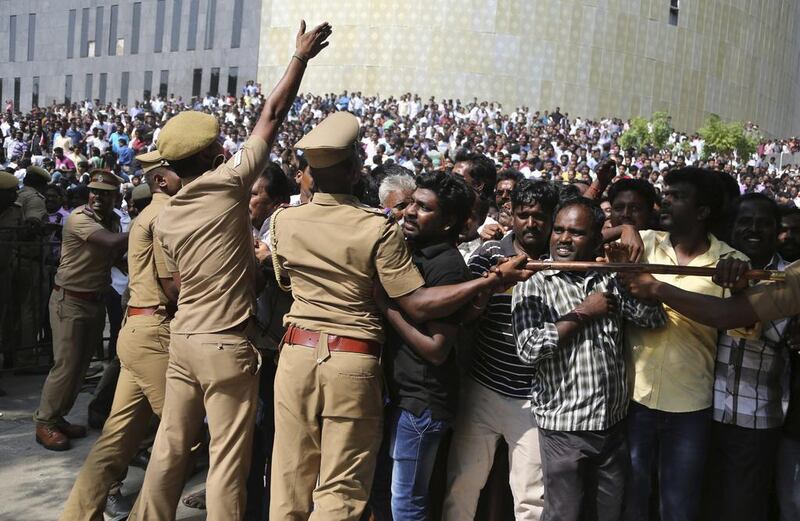Tens of thousands of Indians paid their respects to the late film star turned political leader Jayalalithaa Jayaram on Tuesday before she was laid to rest in Chennai, the state capital of Tamil Nadu where she was chief minister at the time of her death.
Prime minister Narendra Modi and president Pranab Mukherjee were among the dignitaries who visited Jayalalithaa’s body in a Chennai function hall where it lay in state for 12 hours.
In New Delhi, the two houses of India’s parliament observed a minute’s silence before adjourning for the day in a mark of respect for the 68-year-old who died on Monday night.
Jayalalithaa’s body was draped with the Indian flag as it lay in state at Rajaji Hall, with her closest political confidantes standing around protectively. Dozens of members of her party, the All India Anna Dravida Munnetra Kazhagam (AIADMK), sat on the steps of the building.
O Paneerselvam, one of Jayalalithaa’s fiercest loyalists and the new chief minister of Tamil Nadu, broke down as he hugged Mr Modi.
-----------------------------
[ OBITUARY: How Jayalalithaa Jayaram went from reluctant screen star to Indian political powerhouse ]
-----------------------------
Kumari Daniel, who runs a grocery shop in Chennai, the state capital, pulled down her shutters for the day and travelled a dozen kilometres to Rajaji Hall.
"I admired her a lot," she told The National of Jayalalithaa, a four-time chief minister of Tamil Nadu. "She was such a strong woman. Even if I did not agree with some of the things she did, it was difficult not to admire her for how she fought her way into politics, despite having been only a movie actress."
“This is a man’s world, and politics is dominated by men, and yet she was so successful,” Ms Daniel added. “That says something about the kind of person she was.”
At 3.30pm, Jayalalithaa’s body was lifted onto a military truck, which formed the centrepiece of a procession leading to her burial place at a police station on the shores of Chennai’s Marina Beach – located in between memorials to Jayalalithaa’s political and ideological mentors, former chief ministers of Tamil Nadu M G Ramachandran and C N Annadurai.
Led by AIADMK legislators and ministers, the funeral cortège moved slowly through crowds that thronged the three-kilometre route. Helicopters hovered over the procession, and policemen and other security personnel kept people behind barricades to ensure order. But concerns of possible rioting by adoring AIADMK activists, who in the past have descended into a violent frenzy to support Jayalalithaa, proved unfounded.
The crowds lining the procession route, the majority of them women, chanted Jayalalithaa’s name, and wailed and wept – but remained peaceful. Streets elsewhere in Chennai were deserted.
Volunteers banded together to distribute free packets of drinking water to those who had assembled under the afternoon sun, with some mourners fainting from heat and dehydration.
Once Jayalalithaa’s body reached its burial spot, it was transferred to a sandalwood casket. A military band played and soldiers performed a gun salute as a priest administered the last rites.
When the coffin was hammered shut and lowered into the ground, cries rang out across Tamil Nadu, hailing Jayalalithaa as the “Puratchi Thalaivi”, or “Revolutionary Leader”.
The state’s public and educational institutions will remain shut until Thursday in memory of its former chief minister, with the government’s official mourning period ending on Monday – a full week after Jayalalithaa’s death.
“It is a very sad day,” said Christina Paun, a 34-year-old university professor who visited Rajaji Hall to pay her respects to Jayalalithaa. “She was an essential part of the state ... She has left a big void, and we will have to see if someone can fill her shoes.”
SSubramanian@thenational.ae
* With additional reporting by Agence France-Presse





